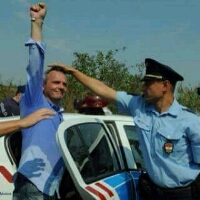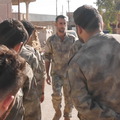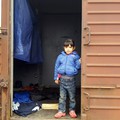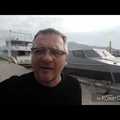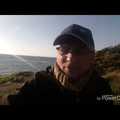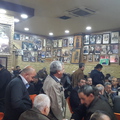Kurdistan's fights to stay above water
- These around us are Arab villages. The people of Daesh (Islamic State) are there. After last year's autumn Peshmerga-offensive they disappeared, dispersed in these villages, - Dr. Kemal Kirkuki, former Speaker of the Kurdistan parliament uses a quite detailed presentation to introduce the situation of the military district West from Kirkuk. Red and blue dots on the map. Red marks the position of Daesh, blue the peshmergas. Doctor Kirkuki took up his uniform again one year ago. He's member of the old school. The only one in the room who's not wearing camouflage military clothes. He's in the traditional brown, baggy trousered uniform of the Peshmerga, tied with a kerchief on the waist.We're somewhere a few kilometres North from Kirkuk, in the command center of the 5th military district. This district is the frontline. Though after Kirkuki's presentation I begin to doubt it and look at my watch more often. It grows dark at six in the evening and it's already past five. It became clear that we crossed some villages that, according to Kirkuki, may hold Deash militants. And we'll have to go back to Erbil on the same route somehow.
- Sykes- Picot agreement is dead - explains Kirkuki. The refugee crisis is a result of that too. I try to interpret what I heard. The agreement, signed in 1916, has arranged the fate of the Middle Eastern territories of the Ottoman Empire, in fact pulling them into the spheres of influence of Great-Britain and France. Maps drawn next to office desks were put into effect that way. And lo and behold became Iraq and Syria, Lebanon, Jordan, Palestine. And all this hasn't got much point anymore. Iraq for example wouldn't be without the Kurd army and the Peshmerga. Even now it only exisits on paper. The country's biggest province, Anbar and second biggest city Mosul were captured by Daesh in the summer, Southern territories are under control of Iran-friendly Shiite militias, Northern territories are controlled by Kurds. None of the significiant oilfields are under the supervision of the government seated in Baghdad.
Diblis is the Western center of the oilfield around Kirkuk. The signs of oil production are everywhere. Pipes, oil wells, indusrial equipments. It is a strategically important place. Under Kurdistan, estimates say there are 55 billion barrels of oil. This is one of the reasons why it was so important for the Kurds to keep the initiative in the chaos that erupted with the appearance of Daesh.While the Iraqi army fell to pieces, the Kurds pushed into Kirkuk, which was determined in the new Iraqi constitution as a so-called disputed territory and ordered the final status of the city to be decided through negotiations between the government and the Kurds. Yet these negotiations never started. The now deposed prime minister Maliki spent the time that flows slowly around here, with completely depriving the Iraqi Sunnis from their rights so there was hardly any time left for governing. And of course Maliki's policy with radicalising the Sunnis has set the stage for Daesh. So onto the disputed territories came at first Daesh then the Kurds who beat them back from the city and its immediate surroundings. After these of course it'll be hard for the Baghdad government, whomever is seated there, to reclaim control over the most important Northern oil deposits.
- Kurdistan's going to be and independent state, - says Doktor Kirkuki. There isn't any trace of passion fueled by a sense of mission. He lists the reasons like if he was wishing a good night. - It's totally clear that this is the best solution for everybody, for the people living here and for the area too. And I won't go into details now, about how many times they used chemical weapons against us. How many times did they try to screw us over, to dispossess us. Iraq needs to be divided to three parts, the Kurds, Shiites and Sunnis should each have their own state.
It definitely seems a simple solution, yet first of all those problems need to be settled that Iraq and inside it Kurdistan are facing. For example the situation of the two million refugees living in the five million- inhabited Kurdistan. Because the refugee wave headed towards the North-Iraqi territory under the supervision of the Kurdistan Regional Government doesn't seem to be calming down. As fights erupt on the Western and Southern parts of the country, as Deash can acquire more territories, refugees are heading off towards Kurdistan, which lives in the minds of the fleeing Arabs as a stable and safe place. At least the possibility of an economy is there every square metre.
- We can't take in every Arab. It would tip over the ethnic balance of the country- explains doctor Kirkuki.
In Kurdistan, there are refugee camps around every big city, moreover, there are refugee camps in the cities too. Primarily the Kurds of the Yazidi faith displaced from Shingal mountains and Arab Christians chased away from around Mosul are living in such camps. At least those who stayed here.
-Those who had money have fled away- tells father Djalal, the pastor and leader of the Ashti camp, which is in the Christian-inhabited Ankawa district of Erbil. The father is the parson of the Catholic community that fled from Qaraqos. He evangelises in a church assembled from habitation containers.
-We're tired. Primarily our souls. Everybody would go home already if they could but the situation doesn't allow this. The children want to go to the schools they got used to. The problem is that Kurdish schools don't have Arab curriculum so education for our children had to be organised from here.
The people of Qaraqos, around sixty thousand people, have set out to the journey on the 7th of august. Daesh took Mosul at the beginning of the summer of 2014, but they left the villages around in peace. Then in August the Peshmerga forces retreated from the territories Southeast from the city and Daesh occupied the defenseless towns in that instant.
-My family came to Erbil sooner- tells Amar Fios Behnan. The sixty years old man was one of the last people who left Qaraqos on that certain day. He was the caretaker of the Christian cemetery. He watched over that as long as he could. They were burying the victims of Daesh even in the last moments. Two children and a young woman, who was killed by a bomb just after her wedding. Amar just shakes his head. He doesn't believe in coincidences. He thinks the whole thing was planned.
- I don't understand why did the Peshmerga retreat. There was no fight, not anything that would force them to this.
Amar briefly summarises his theory about the end of the Iraqi Christian community. He doesn't understand either, why couldn't the Christians arm themselves. He thinks they could've defend their cities if they had the tools. Instead they became refugees.
On the other side of the road is the other half of the camp. Here the situation is a bit more ordered. There are proper living containers. All of them has water connection. Five thousand and five hundred people live here in thousand containers. They are from Bartollah, which was an other Christian-inhabited city, a bit to the Northy from Qaraqos. But there are Shabak Shiites here too.
Ibrahim was a councilmember in the Bartollah local council. We're sitting in the office of the camp, a container. Tea, cigarettes, sentences of medium weight, long silences.
-The problem is that the Christians had no real, heavyweight politicians in Iraq after Saddam.If there were, we wouldn't be sitting here. There was nobody to represent our interests, so anybody could look through us at anytime. Presently we are worrying that president Barzani (president of Iraqi Kurdistan) should not get removed.
Barzani is through his second term this year as president of Kurdistan and accoring to the constitution, he won't be eligible to be nominated for the post again. The only problem is that Kurdistan faces serious economic, political and security challenges with the appearance of Daesh. By the end of summer the country has swerved back from the edge of civil war and if Massoud Barzani would really have to go, it is easily possible that Kurdistan would drift through that thin line that separates peace from armed fights. And if this happens, the Kurds would deprive themselves from a historical opportunity, because in that case they can forget the dream of creating an independent state for long years.
Sadi Pire, chairman of the politbüro of the Patriotic Union of Kurdistan (PUK, better known as the Tabbani-party) welcomes me in the Erbil office of the party. Though the word “office” doesn't decribe exactly the grandiosity of the building. Although it's just two floors tall, the marble-coated wide corridors contain few doors which helps us imagine the sizes of the offices. And I'm not mistaken. The office, crammed with leather armchairs, wants to emit richness and strength. Pire is not happy about the polemics over independence. According to him, such an important ad sensitive matter shouldn't be discussed in front of the publicity.
-My father said to me, man has two ears and one mouth. This is a clear message. Listen twice, talk once- explains Pire the political message spiced with parental advice.
Erbil has been a city for around six thousand years. The city structure is made of concentric structures. All of it is built around the Citadel. At the moment the whole thing is being renovated and will be übercool once finished. The appearance of Daesh last summer and the war threatening Kurdistan seriously hit the economy of the pseudostate. The economic growth that started in 2003 had come to a halt. The city is full with unfinished gigaconstructions and real estate development projects. Of course none of it feels in the vice city. Its immediate surroundings are crowded non-stop. On the main square its hard to make even one step. Kurdistan has become an interesting place of migration going from East towards West. In the hotels, cafés, restaurants only the bosses are Kurds. Everybody else, the waiter, the cleaner, the night porter are Bangladeshis. Kurdistan became a destination of Bangladeshis. It is said that the language is similar, at least the Kurds' Kurmanji dialect is easy to learn, the money is OK and the Kurds can use the cheap labour force. In the years before hundreds of thousands of Bangladeshis have found new life here.
Amir works in Erbil View Hotel. He is a utility man in the restaurant. Brings tea, takes ashtray away, polishes the chmetal handrails by the stairs. - It' good here. They don't maltreat us, and we get proper wage- he explains timidly. And this is enough for someone arriving from the Indian subcontinent. We shyly don't speak about the payment.
Hussein Sewdin takes me to Qushtapa camp. Hussein is a teacher of the Erbil media academy, a film director. He repatriated here from the Netherlands after 2003. In 1991 he with his eleven mates occupied Iraq's embassy in the Hague.
- Two million Kurds were chased across the Turkish border, tens of thousands were killed. We were young, of course we occupied the embassy!- he explains cheerfully. - We couldn't find the ambassador. As it turned out later, he pulled the cardboard box of a television onto himself and was on the higher floor all along. The secretary fainted. One of my mates wanted to piss on her but I didn't let him. Then we turned ourselves in. But by then the world press was already in front of the embassy. So the message got through.
Hussein also reminiscenses about the massacre in Halabja, when five thousand Kurds were killed with mustard gas by the Iraqis in less than half an hour.
-They were experimenting on us, fuck them, and Halabja wasn't the first of this kind. Previously they dropped at the area of Dohuk and Zakho. And the West shipped the gas for them. Because Saddam was fighting against Iran. Realpolitik. There were the pictures of the Halabja victims, we brought them out to the Netherlands and nobody wanted to publish the documents. Iraq was on the good side. So everybody can go to hell. Even now they're shitting around with this independence thing. What more do we need to do to get it, what?! Tell us and we'll do it...
The camp Qushtapa puts an end to Hussein's outspoken and amusing monologue. We show the permit, quickly get through the formalities. They lift the barrier and we're free to go. We stop at the shopping lane. Convenience store, grocery store, barber, electronics shop, photocopy. The camp's shops are lining up like that next to each other. A tall fellow is standing in front of the photocopy salon with his back at the wall. He waves towards us, inviting us to enter the shop. Sherif Ibrahim, Syrian Kurd. They lived thirty kilometres from Damascus. They went from there when the going got rough.
- First came the Free Syrian Army, then al-Nusra Front and finally Daesh. And the Assad regime was constantly there. So we didn't feel safe very much.
I ask Sherif why didn't he stay at home and fight. For the Kurds have army in Syria too. Sherif puts his hand onto his right thigh. He pats it.
-Well because of this- taps his fingers on his thigh. On the thigh of his artificial leg.-Eight years ago a tank went across my car. It was a simple peacetime accident and since the army in Syria hasn't got the slightest responsibility to compensate, I wasn't even paid money. I can be glad to have survived.
Why doesn't he sets out towards Europe? Because he hasn't got the money. And even if he had, he would think twice about spending on this. He'd rather go home if possible.
-People stayed here for three reasons. Those who haven't got money, those who would never leave and those who are watching over the elder family members.- This is what still keeps us here. And that 1100 families too, who live here in a dusty refugee camp, thirty kilometres South from Erbil, next to the motorway. And they still live here and haven't yet dared to have a go at the great adventure in which winning is possible but losing is sure. Of course those who went don't care about this, the relative safety doesn't matter, neither the spoken common language with the majority of the people, nor the identity. Being a refugee, being a wretch is miserable in Kurdistan too.
(The project is part of the Transatlantic Leadership Initiative” (TLI) and was made possible by support from the German Marshall Fund of the United States.Opinions expressed in this publication do not necessarily represent those of the German Marshall Fund of the United States, or its partners.)
